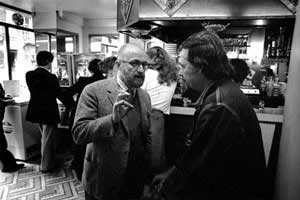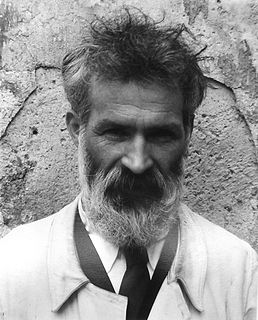A Quote by Alexander Calder
When an artist explains what he is doing, he usually has to do one of two things: either scrap what he has explained, or make his work fit in with the explanation.
Related Quotes
I don’t like the idea of “understanding” a film. I don’t believe that rational understanding is an essential element in the reception of any work of art. Either a film has something to say to you or it hasn’t. If you are moved by it, you don’t need it explained to you. If not, no explanation can make you moved by it.
I enjoy doing my work, and I don't want to deal with the other things. When you enjoy doing your work so much, why deal with where to show, how to show, what to do? If the artist finds the right gallery which respects their work and gives them that freedom to do whatever they want to do, the artist can focus on his work.
A work of art does not need an explanation. The work has to speak for itself. The work may be subject to many interpretations, but only one was in the mind of the artist. Some artists say to make the work readable for the public is an artist’s responsibility, but I don’t agree with that. The only responsibility to be absolutely truthful to the self. My work disturbs people and nobody wants to be disturbed They are not fully aware of the effect my work has on them, but they know it is disturbing.
Even in chimps there is true altruistic behaviour; behaviour that doesn't fit into the sociobiological model that says you either help a close relative and thereby your own genes, or you help somebody else now in return for their help in the future. When a very high-ranking male chimpanzee rescues a little orphan, saving his life, that kind of explanation doesn't work.
We have this desire for everything to be explained to us. But if you go through your daily actions, very little ends up having a written-down explanation for why things happen, or why people do specific things. So it made sense to me to reflect the human condition that not every action has an explanation. We act, and then later maybe come to an understanding about it, or maybe not.
Being an artist and being a teacher are two conflicting things. When I paint, my work manifests the unexpected... In teaching it's just the opposite. I must account for every line, shape and colour and I am forced to give an explanation of the inexplicable and account for the variety of styles the students present.
I decided that the whole idea of what it means to be an artist was that somehow you are ontologically oriented toward poverty : "As an artist, you don't make money." I had to figure out some kind of way to guarantee that I'd be able to continue doing the work that I wanted to do, whether I made money from the work I was doing or not.
Every time I put a collection together I'd scrap it because there was no "meaning," until I wrote about the two black men - friends - in the beginning of the book. So much of their experience was ABOUT trying to find friends in the authors/artists I wrote about - subjects that were/are a source of comfort, somehow, since none of them "fit," either
Anyone who appears to be triggered out of watchfulness and into action by your appearance must be explained. Anyone observing you carefully must be explained. Anyone whose behavior seems to be geared to yours must be explained. If the explanation does not satisfy you, be ready to take appropriate defensive action.
It's great when a director like Cameron Crowe can take what you do and fit it into what he's doing. If someone's a fan of you already, they can take what you do and make it work for what they're doing. You don't know their vision, and you're thinking, 'How is this guy going to take what I do and make it work in this movie?'







































